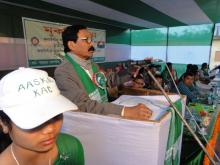Trade is the ‘spinal cord’ of a country’s economy and the traders are its protectors. It was said at a time, when our traders were among the most trusted nationals, who scarified all their earnings of life and belongings, when the country needed it.
Now, the time has changed and the national feelings in the trading community have gradually diminished. ’Honesty’ the essence of the trade has lost its value and it is no more the ‘best policy’ in the trade. Majority of the traders feel difficulty in surviving, if they try to be honest in the present political situation of the country. They have to oblige political leaders and parties, some of whom have ‘stained’ background. To fulfill the demands of such parties and gain more profit out of their business, most of the traders have invented the technique of more earnings with less investment and spurious products. They try to evade legal taxation and the loopholes of our taxation policy encourages them to adopt such unfair practices for their monetary gains, even at the cost of their national duties.
It has become a common practice among the trading community to show less transaction in ‘black and white’ with intention to evade taxation. Now a days there are a few professionals, who teach them the technique of evading taxation and protect ‘black money’. In business transactions of crores of rupees, is done without valid documents. Such transactions affect badly the co-traders, who in return have to practice the same procedure. This automatically results in loss of revenue by the government. This practice leads to accumulation of black money and crisis in circulation of ‘white money’ . The traders, who try to remain honest and sincere in the trade lose interest in such circumstances.
The consumers in our country complain about the quality of products and the high prices they pay for sub-standard goods. They do not mind to pay high prices, provided they get the quality products. It is fact, that our industries are competent of producing the quality products, but because of the middlemen’s interest the consumers get the adulterated or the inferior quality goods. which are rejected and sold at the cheapest rates. It is easy for the middlemen to make the things convenient to their own interest. They either change the label and signs of the sub-standard goods for the standard one or they mix up a sub-standard product with the standard one. This practice also creates a lot of confusion in the minds of consumers, who become the victim of their faith and trust in the traders.
Imagine, the reaction in a consumer’s mind, when he finds that a particular item is sold at a cheaper rate than the declared Minimum Retail Price (MRP) which is meant to facilitate the interest of producers. On many occasions cement, polyester fabrics, utensils, cosmetics, vegetable oils etc; had appeared in the market at cheaper rates and vanished in due course. Such items had never got regular customers. Such products were driven out of the market, but not before a few ‘dishonest traders’ minted hefty money out of the trade.
Adulteration has become a common practice in the trade. due to heavy competition, taxation and lack of honesty. Even some of the big business houses, who were conscious of their quality and reputation are now involved in such malpractices. This gradually compels the petty traders to follow them for their own survival. Political corruption is highly responsible for moral degradation of the trading community. The men with political influence dominate over the trade. They need funds for their political activities which they can get only from the trading community. They assure some benefits and relief to them in lieu of their favor. The traders’ unfair means are overlooked by the men in power. Whereas the political parties get the fund, the nation as a whole remains deprived of its legitimate dues. Almost every year there is a deficit financing in the budget, heavy taxation, increase in inflation and despite all this development as planned for is never achieved. Black money which grows in the country leads to many other illegal and illicit acts and harms the entire human society. To build up the character of the nation, the moral of the traders must he high. Unless they are sincere to their people and country’s reputation, they cannot exist in the long run. The slogan of the ‘Honesty is the best policy’ is an universal truth and has to exist for ever.






Add new comment